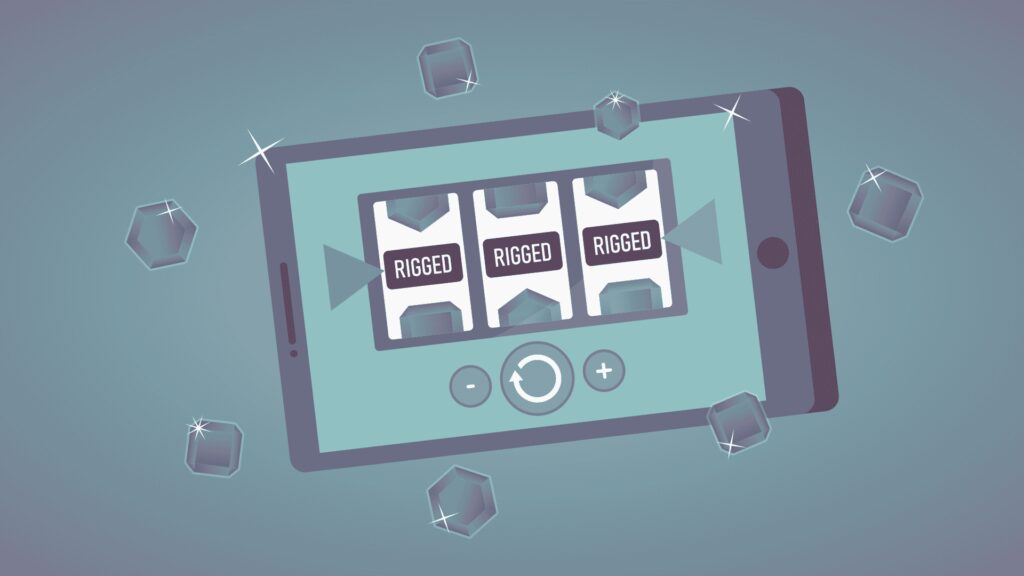Online poker in the US has taken the world by storm, with millions of players logging in daily to try their luck and skill against opponents from all over the globe. But with its rise in popularity, there’s been a surge in skepticism.
Many players wonder: Is online poker in the US rigged? To answer this question, we’ll delve deep into the technology behind online poker platforms and explore the measures taken to ensure fair gameplay.
The Birth of Online Poker Skepticism
The skepticism surrounding online poker isn’t unfounded. Players have voiced concerns about suspicious patterns, such as facing too many bad beats or consistently getting poor hands. But are these patterns a result of rigged systems, or are they just the natural ebbs and flows of the game?
Random Number Generators (RNGs)
At the core of every online poker game is a Random Number Generator (RNG). This complex algorithm ensures that cards are dealt randomly, mimicking the unpredictability of a live game.
- How RNGs Work: RNGs use mathematical formulas to produce sequences of numbers that appear random. These numbers then correspond to specific cards, ensuring a random deal every time.
- Certification of RNGs: To maintain transparency and trust, many online poker platforms have their RNGs certified by independent third-party agencies. These agencies test the RNGs to ensure they produce truly random results.
Player Patterns vs. Game Patterns

Source: qrius.com
One common misconception is that the game is rigged against individual players. However, it’s essential to differentiate between player patterns and game patterns.
- Player Patterns: These are the strategies and habits that a player develops over time. Opponents can predict and exploit these patterns, leading to a string of losses for the predictable player.
- Game Patterns: These refer to the sequences in which cards are dealt. With a certified RNG, these patterns remain random and unbiased.
Security Measures Against Cheating
While the game itself isn’t rigged, there’s always a concern about dishonest players trying to game the system. Online poker platforms employ various security measures to detect and prevent cheating.
- Anti-Collusion Measures: Poker sites monitor player behavior to detect signs of collusion (where two or more players work together to cheat others). Suspicious accounts can be flagged for review or even banned.
- IP and GPS Tracking: To prevent players from creating multiple accounts or logging in from restricted regions, many platforms track IP addresses and GPS locations.
- Encryption: To protect player data and ensure the integrity of the game, poker sites use advanced encryption techniques.
The Role of Player Pools
Some players believe that they’re consistently matched against stronger opponents, leading to the perception of a rigged game. However, this can be explained by the concept of player pools.
- How Player Pools Work: When you log into a poker site, you’re placed in a pool with players of similar skill levels. As you improve, you move up to more challenging pools.
- The Perception of Rigging: Moving up in pools means facing tougher opponents, which can lead to a string of losses. This isn’t a sign of a rigged game but rather a natural progression in the world of competitive poker.
Human Psychology and Confirmation Bias

Source: gamblingsites.com
Our brains are wired to seek patterns, even when none exist. This cognitive bias, known as confirmation bias, can lead players to believe the game is rigged against them.
- Understanding Confirmation Bias: When players experience a bad beat, they remember it more vividly than their wins. Over time, they might feel that they’re unfairly targeted, even if the game’s outcomes are genuinely random.
- Overcoming the Bias: It’s crucial for players to approach online poker with a clear mind, understanding that losses are a natural part of the game. Keeping track of wins and losses can provide a more objective view of one’s performance.
The Bottom Line
Given the stringent measures in place, the vast majority of online poker platforms are not rigged. They use certified RNGs, employ robust security measures, and constantly monitor gameplay to ensure fairness.
However, like any online platform, there’s always a risk of encountering dishonest players or lesser-known sites that don’t adhere to industry standards. It’s essential for players to choose reputable platforms, stay informed, and approach the game with a balanced perspective.
In conclusion, while the frustrations of losing can be disheartening, it’s crucial to remember that online poker, when played on a reputable platform, offers a fair and unbiased gaming experience. The real challenge lies not in battling rigged systems but in mastering the game’s intricacies and outwitting opponents.
Reputable Platforms
Not all online poker platforms are created equal. While many uphold the highest standards of fairness and security, others might not be as scrupulous.
- Licensing and Regulation: Before signing up, players should check if the platform is licensed and regulated by a recognized authority. Licensing ensures that the platform adheres to specific standards and undergoes regular audits.
- Player Reviews and Feedback: One of the best ways to gauge a platform’s reputation is by reading player reviews. While a few negative reviews are standard, a pattern of complaints about fairness should raise red flags.
External Auditors
To further instill trust, many top-tier online poker platforms invite external auditors to review their systems.
- Purpose of Audits: These audits aren’t just about checking the RNG. They also review payout rates, player complaints, and security measures.
- Transparency: Many platforms publish these audit results, allowing players to see for themselves that the games are fair.
Educating Players

Source: zamsino.com
Misconceptions about online poker’s fairness persist, in part, due to a lack of understanding about how the technology works.
- Tutorials and Resources: Many platforms offer tutorials, not just on playing poker, but also on how their systems ensure fairness. These resources can be invaluable for players looking to educate themselves.
- Customer Support: A responsive customer support team can address concerns about fairness, explain platform features, and provide reassurance to players.
The Future of Fair Online Poker
As technology evolves, so does the world of online poker. With advancements in blockchain and artificial intelligence, we can expect even more transparent and secure platforms in the future.
- Blockchain and Poker: Some platforms are exploring blockchain technology to create transparent systems where every move is recorded and can be verified by players.
- AI and Security: Artificial intelligence can be used to detect cheating patterns more efficiently, ensuring a level playing field for all.
FAQs
What ensures that the cards dealt in online poker are random?
Online poker platforms use Random Number Generators (RNGs) to ensure that cards are dealt randomly. These RNGs are complex algorithms designed to mimic the unpredictability of a live game.
How can I be sure that an online poker platform’s RNG is genuinely random?
Many reputable online poker platforms have their RNGs certified by independent third-party agencies. These agencies conduct rigorous tests to ensure that the RNGs produce genuinely random results. Always check for certification badges or information on the platform’s website.
Are there measures in place to prevent players from cheating in online poker?
Yes, online poker platforms employ various security measures, such as anti-collusion algorithms, IP and GPS tracking, and advanced encryption techniques, to detect and prevent cheating.
Why do I feel like I’m always matched against stronger opponents?
Online poker platforms often use player pools, grouping players of similar skill levels together. As you improve, you might move up to more challenging pools, facing tougher opponents. This progression ensures that players are consistently challenged, but it can sometimes be mistaken for a rigged system.
How can I ensure I’m playing on a reputable online poker platform?
Before signing up, check if the platform is licensed and regulated by a recognized authority. Reading player reviews, checking for external audit results, and ensuring the platform has responsive customer support can also indicate its reputation and trustworthiness.
What advancements can we expect in the future to ensure even fairer online poker gameplay?
The future of online poker looks promising with advancements in blockchain and artificial intelligence. Blockchain can offer transparent systems where every move is verifiable, while AI can enhance security measures, detecting cheating patterns with even greater efficiency.

Source: fotolog.com
FAQs
What is Expected Value (EV) in poker?
Expected Value (EV) refers to the average amount of money a player expects to win or lose from a particular decision over the long run. It’s a foundational concept in poker theory, helping players assess the potential profitability of their decisions.
How can I effectively read my opponents in online poker?
While online poker lacks physical cues, you can still gauge player tendencies through their betting patterns, timing tells, and gameplay style. For instance, quick raises might indicate a strong hand, while consistent hesitation could suggest uncertainty.
What tools can I use to enhance my online poker gameplay?
There are several tools available, such as poker trackers, which analyze your hands and provide gameplay insights. Additionally, many online platforms allow note-taking on opponents, helping you remember specific player behaviors.
How important is my position at the poker table?
Positional play is crucial in poker. Being in a late position, for instance, allows you to act after seeing how others play their hands, providing more information and strategic advantages. Conversely, an early position requires more caution since fewer players have acted before you.
How can I manage my emotions and avoid going on tilt?
Recognizing the signs of tilt, such as frustration or overconfidence, is the first step. When you sense these emotions, take a break from playing. Employ coping strategies like deep breathing, listening to calming music, or even stepping away from the game for a while.
Is it essential to diversify the poker games I play?
Diversifying your game can enhance your skills and offer fresh perspectives. Different poker variants have unique strategies and nuances. By exploring various games, you become a more adaptable and well-rounded player. Plus, it keeps the game exciting and challenging.
Conclusion
The world of online poker is vast and varied. While there are always risks associated with online gaming, the notion that most platforms are inherently rigged is a misconception. By choosing reputable platforms, staying informed, and understanding the technology behind the game, players can enjoy a fair and exciting gaming experience.
Remember, poker is as much a game of skill as it is of luck. Instead of focusing on perceived biases, channel that energy into refining your strategy, reading your opponents, and trusting in the technology that brings the game to your fingertips. The real thrill of poker lies in the challenge, and with diligence and practice, you can rise to the top, fair and square.



